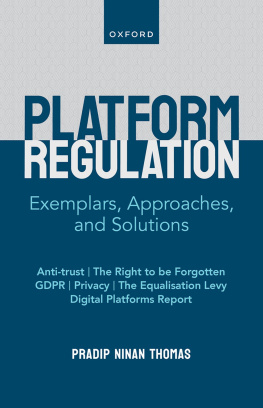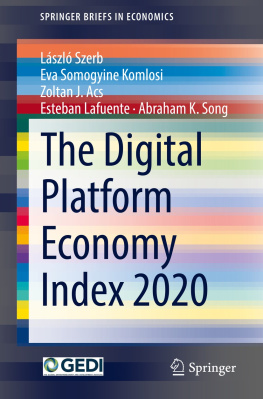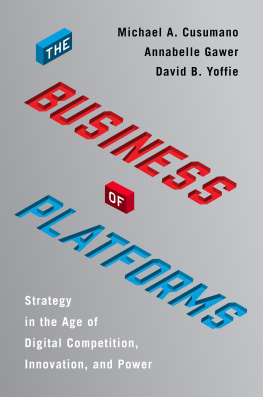Platform Regulation

Great Clarendon Street, Oxford, ox2 6dp,
United Kingdom
Oxford University Press is a department of the University of Oxford.
It furthers the Universitys objective of excellence in research, scholarship, and education by publishing worldwide. Oxford is a registered trade mark of Oxford University Press in the UK and in certain other countries
Pradip Ninan Thomas 2023
The moral rights of the author have been assertedFirst Edition published in 2023
Impression: 1
All rights reserved. No part of this publication may be reproduced, stored in a retrieval system, or transmitted, in any form or by any means, without the prior permission in writing of Oxford University Press, or as expressly permitted by law, by licence or under terms agreed with the appropriate reprographics rights organization. Enquiries concerning reproduction outside the scope of the above should be sent to the Rights Department, Oxford University Press, at the address above
You must not circulate this work in any other form and you must impose this same condition on any acquirer
Published in the United States of America by Oxford University Press
198 Madison Avenue, New York, NY 10016, United States of America
British Library Cataloguing in Publication Data
Data available
Library of Congress Control Number: 2022913664
ISBN 9780192887962
eISBN 9780192887986
DOI: 10.1093/oso/9780192887962.001.0001
Links to third party websites are provided by Oxford in good faith and for information only. Oxford disclaims any responsibility for the materials contained in any third party website referenced in this work.
To All Creatures Great and Small that have kept me Company as I wrote this book. Thankyou.
The Tree Snake and the Blue Tongue,
Magpie and Kookaburra,
To Kamikaze Peewees,
And
Moss our Goldie
Gentle Soul
Getting Rickety Too Soon
Preface
from us but not for us. There is, from the point of view of Zuboff, nothing that is accidental about the Stack.
This unprecedented power of platforms is, however, being challenged today. Data breaches, evidence of platform manipulations, platform complicities with state surveillance, their monopolist behaviours, and its consequences for competition and data privacy have become the basis for regulatory responses from governments throughout the world. National and regional courts of law have collected masses of evidence on myriad forms of platform illegalities that discriminate against competitors and that point to the privatization of personal data on a global scale. The fact that the worlds largest platforms are of US origin may just be coincidental although in the context of the European Union (EU) and their commitment to a single European Digital Market, their historical antipathy towards US-based information and cultural imperialism, now includes US-based data imperialism. After what one can consider was an extended grace period during which platforms were able to constantly and systematically innovate in very disruptive ways in environments that were devoid of any regulatory oversight, it would seem that the goodwill that governments had towards platforms is no longer carte blanche but is based on a critical, new-found discernment of algorithmic fiat and the role played by these platforms in shaping individual behaviours, political choices, and economic futures. The default position was self-regulationa stance that Big Tech continues to believe in as the only feasible solution. However, self-regulation has largely failed and there is a widely held view that it has not been able to deal effectively with some of the fundamental issues related to Big Tech companiesthe fact that they exercise effective control over both personal and non-personal data and that they are inherently anti-competitive in their economic behaviour. At the very same time, platform entanglements and platform compromises with authoritarian governments and political parties have highlighted the fact that regulation can be shaped by extra-regulatory factors, such as religious nationalism and reasons of national security as is the case in India, and systematically used by political parties such as the Partido Federal ng Pilipinas and the current President of the Philippines, BongBong Marcos to rewrite the history of corruption and misrule by his father Ferdinand Marcos in the Philippines. These witting or unwitting, tacit or open collaborations between platforms and political parties that have benefited has argued
The current platform governance status quounderstood as the set of legal, political, and economic relationships structuring interactions between users, technology companies, governments, and other key stakeholders in the platform ecosystem is rapidly moving away from an industry self-regulatory model and towards increased government intervention.
This volume highlights four regulatory responses from four jurisdictionsnamely the EU, the United States, India, and Australia. The reason for choosing these four case studies and not others is because of my own research interest in the case of regulation in India and the EU, teaching platform regulation on a course offered at the Indian Institute of Technology (Bombay) during 20202021, and also because the EU, the United States, and Australian cases of regulation are topical and have fed into global discussions across multiple media sectors. Facebooks very public tussle with regulatory authorities and the government of Australia, in particular, its blocking of news has been trending on news platforms across the world. As a researcher primarily interested in the political economy of communications, I have, over the years, written extensively on the many ways in which the digital has been shaped by structures and institutions, by political imperatives and geopolitical considerations, by the power of Big Tech and the Stateto create on a global scale a digital mode of production that has, to some extent, subsumed other extant modes of production in its image.and reflected on the consequences of this digital imperative for the public good. Arguably platform capitalism has contributed to a sharpening of the contradictions in capitalist value creation in a transactional economy in which the conditions of labour and labouring have become precarious for millions of workers. This volume highlights the power of Big Tech but critically the counter power of the State to claw back some advantage in shaping the terms of Big Techs presence and operations in key jurisdictions around the worldplatform regulation contributing to a level playing field and competition, to strengthening the exchequer and the rights of consumer-citizens.
This story of regulation is incipient and is therefore incomplete. Regulation is progressing in fits and starts in different jurisdictions around the world. And as such, the case studies in this volume are by no means a reflection of wholly complete processes but are rather, snapshots of regulation in process at a particular moment in time. In some jurisdictions such as the EU, pathways are clearer. Without a doubt, the response from the EU via instruments such as the General Data Protection Regulation (GDPR, 2018) and Digital Services Act and Digital Markets Act (2020) communicate a clear and unequivocal intent to regulate Big tech and the EU has as it were, thrown down the gauntlet to global platforms. Many of these platforms have been taken to court and multiple anti-trust rulings have highlighted in no uncertain terms, the EUs vision of a digital society that is based on the public good. There are of course critics who point to the unworkableness and complexities of principles such as the right to be forgotten although arguably, this can be seen as a counter-disruptor to platform fallacies and futures based on their perfect control over personal data in perpetuity. The planetary scale of platform expansion across multiple sectors has been called into question and there is a renewed call from governments around the world, even from the United States, to regulate platforms that have colonized the search, social, and e-commerce markets and shaped it in their own image.













